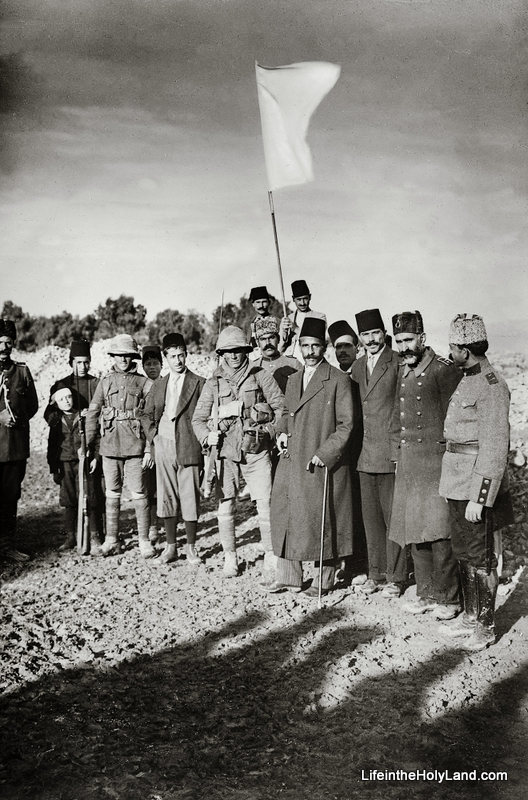(Post by Seth M. Rodriquez)
Last week we provided a brief history of the American Colony and G. Eric Matson. Before we move to the next collection in the Historic Views of the Holy Land series, there is one other story about the American Colony that I have to share.
Due to their reputation for organizing charitable work, their connections with the local authorities, and their location within the city of Jerusalem, the American Colony was able to play a role in some of the major historical events of their day. Last week I mentioned that they were involved in the visit of Kaiser Wilhelm. Another example is the following story about the day that the mayor of Jerusalem surrendered to the British in 1917:
The final approach of the British forces to Jerusalem, in December 1917, and the subsequent surrender of the city, involved American Colony personnel in a number of curious and fascinating ways. For one, it gave rise to perhaps the most memorable of all American Colony photographs, that of the “first” surrender—by some counts there were as many as five!—of the city of Jerusalem in World War I. By the morning of December 9th Turkish army units had completely withdrawn from Jerusalem and the Turkish governor, Izzat Pasha, fleeing shortly before dawn (in a horse-drawn carriage borrowed from the Colony!), left in the hands of the mayor a letter of formal surrender, including an order that not a shot was to be fired in the city‘s defense. Thus, that Sunday morning the city‘s Arab mayor, Hassain Effendi al-Husseini, armed with the Pasha‘s letter of capitulation, set out to turn the city over to the British. On his way he first stopped to inform his close neighbors at the American Colony, where he had once been a student and was still a frequent visitor. Stopping first at the Big House he encountered Lewis and Edith Larsson, then proceeded to the nearby Vester house where his good friend Anna Spafford was then in residence. In the meantime, Larsson grabbed his camera, his three-year-old son, and a young assistant and hurried to join the mayor‘s growing group in Jaffa Road. In the process, someone from the American Colony—accounts differ as to who—fashioned the requisite white flag of surrender: a bed-sheet from one of the Colony-run hospitals nailed to a broomstick.
Near the village of Lifta on the western fringes of Jerusalem, the party encountered the British forward units, and the mayor tried to “surrender” to two sergeants on sentry duty. While they were waiting for higher-ranking officers to arrive, Larsson immortalized the moment with his camera, a scene showing the mayor, his entourage of municipal officers and Turkish policemen, Sergeants Hurcomb and Sedgewick of the Londoners, and the white bed-sheet flag—the famous image of the “first” surrender of Jerusalem. In the ensuing few hours, al-Husseini also “surrendered” to two artillery officers; to their commander, a Lieutenant Colonel Bailey; and then to Brigadier General C. F. Watson. Some of the local leaders asked Watson, as the ranking officer on the scene, to show himself to the populace in order to help quell some looting that had already broken out. Thus it was that Watson appeared with the mayor at Jaffa Gate and there (according to at least one version) accepted the mayor’s surrender document …. On this occasion, Larsson managed to take more photos, including an “official” shot of Watson opening the letter of surrender, with Mayor Husseini and others standing beside him. This all occurred by about 10 a.m….
Larsson also managed to save the makeshift truce flag, which eventually found its way to the Imperial War Museum in London.
Quotation from Tom Powers, “Jerusalem’s American Colony and Its Photographic Legacy,” (essay included in The American Colony and Eric Matson Collection, 2009), pp. 35-36, 38. This photo and over 400 others are included in Volume 7 of The American Colony and Eric Matson Collection, and can be purchased here with free shipping. For more information on the surrender of Jerusalem, see my previous post here.
